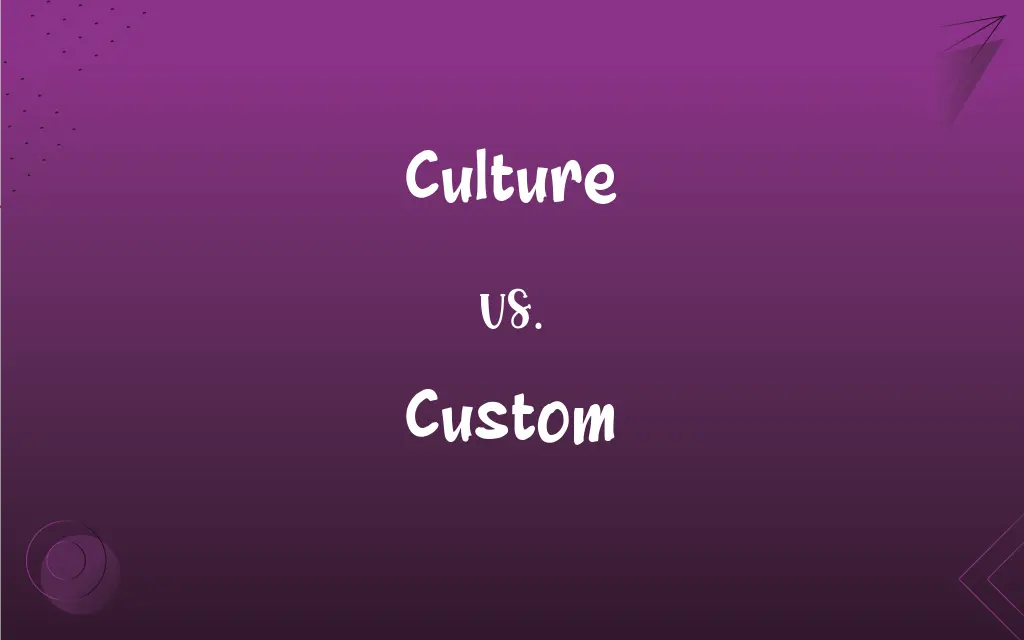Culture vs. Custom: What's the Difference?
Edited by Janet White || By Harlon Moss || Updated on October 16, 2023
Culture is a collective set of beliefs, values, and practices, while custom is a specific traditional practice or behavior.

Key Differences
Culture encompasses the shared beliefs, values, norms, arts, knowledge, and behaviors of a group or society. Custom, on the other hand, refers to a specific tradition, habit, or practice that is followed by the members of a particular society or group.
Culture is a broad umbrella that covers various aspects of life, from religion to language, art, and social norms. Customs are specific manifestations of that culture, reflecting how the larger values and beliefs are put into practice in everyday life.
Culture is continuous, evolving over time as societies grow, change, and interact. Customs can be transient, with some customs fading away while new ones emerge, depending on various influences, including external ones, on a society.
Culture provides a framework that shapes the way a group or society views the world and interacts with it. Custom, on the other hand, represents the tangible actions and practices derived from this framework, guiding individual and collective behavior.
Culture is passed down through generations as a collective memory, a shared understanding of the world. Customs are the rituals, habits, and practices that individuals adopt, often from their predecessors, reinforcing the shared culture.
ADVERTISEMENT
Comparison Chart
Definition
A shared set of values, beliefs, and practices.
A traditional or habitual practice.
Scope
Broad, encompassing various aspects of life.
Specific, often linked to particular occasions.
Change over time
Evolves and can be influenced by many factors.
Can appear, change, or fade over time.
Origin
Collective, passed down through generations.
Often originates from past practices or beliefs.
Function
Provides a worldview and identity.
Guides specific behaviors and practices.
ADVERTISEMENT
Culture and Custom Definitions
Culture
A system of shared beliefs, values, and behaviors.
The culture of the community emphasized respect for elders.
Custom
A habitual way of behaving.
It's her custom to go for a jog every morning.
Culture
The arts, customs, and habits that characterize a particular society.
The culture of ancient Greece is evident in its temples and sculptures.
Custom
A traditional practice or behavior.
It's a custom in our family to eat dinner together every Sunday.
Culture
The attitudes and feelings that are typical of a group.
The office culture was one of collaboration and open communication.
Custom
Duties or taxes imposed on imported or exported goods.
He had to pay customs on the items he brought from abroad.
Culture
A refinement of thought, manners, and taste.
Her exposure to multiple countries endowed her with a rich culture.
Custom
Established practice accepted by a group or society.
It's a local custom to greet each other with a handshake.
Culture
The cultivation of bacteria or other organisms in a controlled environment.
The scientist grew a culture of the bacteria in the lab.
Custom
Tailored to individual specifications.
He ordered a custom suit for his wedding.
Culture
The arts, beliefs, customs, institutions, and other products of human work and thought considered as a unit, especially with regard to a particular time or social group
Edwardian culture.
Japanese culture.
Custom
A traditional practice or usual way of doing something followed by a social group or people.
Culture
These arts, beliefs, and other products considered with respect to a particular subject or mode of expression
Musical culture.
Oral culture.
Custom
The tradition or body of such practices
The respect that is by custom accorded to the king.
FAQs
Why is culture important to society?
Culture provides identity, unity, and a shared understanding of the world.
What is culture in simple terms?
Culture is the shared beliefs, values, and practices of a group.
Are customs static or can they change?
Customs can change, emerge, or fade over time, influenced by cultural shifts.
How does culture influence custom?
Culture provides the framework and values from which customs emerge.
Do all members of a culture practice the same customs?
Not necessarily; customs can vary within the same culture based on region, religion, or personal choice.
What defines a custom?
A custom is a traditional or habitual practice or behavior of a group.
Why do customs vary from one place to another?
Customs are influenced by local beliefs, history, environment, and interactions.
Can one's personal culture differ from the mainstream culture?
Yes, individuals can have personal cultures influenced by various experiences and identities.
Can culture and customs be commercialized?
Yes, elements of culture and customs can be commercialized, often seen in tourism and marketing.
Can a single act or practice belong to multiple cultures?
Yes, certain customs or practices can be shared or adapted by multiple cultures.
Is language a part of culture or a custom?
Language is a component of culture, while the way it's spoken or rituals surrounding it can be customs.
Are customs legally binding?
While customs are traditional, they aren't necessarily legally binding, though some can be incorporated into local laws.
How does one learn about a different culture and its customs?
Through education, travel, interactions, research, and open-minded exploration.
Can an individual influence a culture or custom?
While individuals can introduce or champion changes, broad acceptance is needed for a lasting impact on culture or custom.
Can a custom exist outside of culture?
Customs are generally specific manifestations of a broader culture.
How does culture evolve over time?
Culture evolves through external influences, societal changes, and generational shifts.
How does culture impact communication?
Culture shapes language, non-verbal cues, and communication norms.
Why is understanding culture and custom important in business?
It ensures respectful and effective communication, and caters to diverse needs.
Is food a representation of culture or custom?
Food is a component of culture, and the ways it's prepared and consumed can be customs.
Can new customs be introduced into a culture?
Yes, influenced by changes in society, technology, or external interactions.
About Author
Written by
Harlon MossHarlon is a seasoned quality moderator and accomplished content writer for Difference Wiki. An alumnus of the prestigious University of California, he earned his degree in Computer Science. Leveraging his academic background, Harlon brings a meticulous and informed perspective to his work, ensuring content accuracy and excellence.
Edited by
Janet WhiteJanet White has been an esteemed writer and blogger for Difference Wiki. Holding a Master's degree in Science and Medical Journalism from the prestigious Boston University, she has consistently demonstrated her expertise and passion for her field. When she's not immersed in her work, Janet relishes her time exercising, delving into a good book, and cherishing moments with friends and family.































































